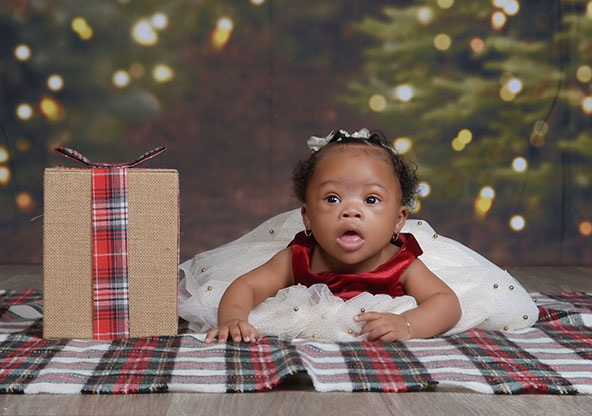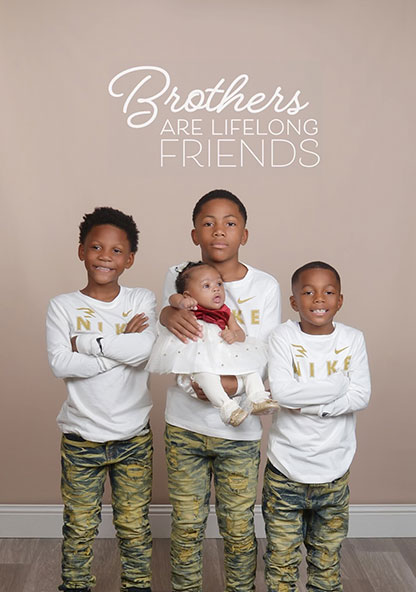Journey of Love: Cherrelle's Path to Motherhood with Baby Jeniyah

“I was feeling all the symptoms you feel when you are pregnant,” said Cherrelle. “I missed my period and was more tired than usual. So, I decided to take a home pregnancy test – and the second line popped up immediately. I took a few more tests – and all of them were positive.”
Already a mom of three boys, the news that she was expecting a girl brought tears to her eyes.
“This pregnancy held a special significance for me,” said Cherrelle. “My late grandmother, who passed away six months before I found out I was pregnant, had always spoken of a baby girl joining the family. The connection to my grandmother's words made this one extra special.”
My Pregnancy Journey
When Cherrelle was 10 weeks pregnant, the joy of impending motherhood was accompanied by concern when a routine genetic tested hinted at the possibility of Down syndrome. Her OB-GYN guided her through the early stages of her pregnancy, providing reassurance as the baby’s ultrasounds showed a healthy developing baby. Even so, her doctor decided to refer Cherrelle to a maternal fetal medicine specialist for additional testing.
“I was around 16 weeks when I started seeing Dr. Emma Rodriguez, my maternal fetal medicine physician at CHRISTUS Children’s,” said Cherrelle. “Every month, I saw my OB-GYN and Dr. Rodriguez who would check on my baby’s growth and development. From the moment I met Dr. Rodriguez, she made me feel comfortable. I was scared, nervous and a rollercoaster of emotion. Every day I googled about Down syndrome, not really knowing what to expect if my child had this condition.”
Dr. Rodriguez sent Cherrelle to the Genetics Clinic at CHRISTUS Children’s. During her session, the genetic counselor provided her with information and support concerning genetic conditions, helping her understand the potential genetic risks and exploring available testing options. After this consultation, Cherrelle opted for an amniocentesis to confirm if her baby had Down syndrome.
At CHRISTUS Children’s, Cherrelle underwent an amniocentesis, a medical procedure in which a small amount of amniotic fluid (the fluid that surrounds the fetus in the womb) is withdrawn to assess various factors, including the baby’s chromosomes to detect any genetic abnormalities.
“For all I knew, there were no markers of Down syndrome on my baby’s ultrasounds,” said Cherrelle. “I thought everything was normal, and my baby appeared healthy. However, when I got the amniocentesis results, it confirmed that my baby had Down syndrome. Accepting the diagnosis was challenging for me as I had never experienced having a baby with a genetic condition before. My primary concern at that moment was how my baby would look like.”
Down syndrome is a genetic disorder caused by the presence of an extra copy of chromosome 21. This extra genetic material can alter the course of development, leading to distinct physical features, intellectual disabilities and sometimes health problems.
“The specific characteristics and severity of symptoms can vary widely among babies with Down syndrome,” explained Dr. Rodriguez. “In our approach to monitoring pregnancies where Down syndrome is confirmed, we tailor our care to address the individual needs of the baby and the mother. We conducted regular and thorough assessments for Cherrelle, coupled with a compassionate and supportive environment to ensure the best possible outcomes for both during this journey.”
The confirmation of the diagnosis stirred a wave of emotions in Cherrelle. Wrestling with feelings of guilt and uncertainty, she found solace in Dr. Rodriguez's caring and positive guidance. Throughout the pregnancy, Dr. Rodriguez and the genetic counseling team at CHRISTUS Children’s provided professional and compassionate support, addressing Cherrelle's fears and keeping her comfortable.
Jeniyah’s Arrival
The night before Cherrelle was scheduled to have a baby shower, her water broke at home. “We had plans for a baby shower and she was born right on the day of the celebration.”
On July 16, 2023, at 37 weeks, Cherrelle welcomed Baby Jeniyah, weighing 7 pounds, 9 ounces.
“When I saw my daughter for the first time, she was beautiful in every way,” said Cherrelle. “All my stress and anxiety went away when we locked eyes. A few weeks after she was born, I went to Dr. Rodriguez’s clinic at CHRISTUS Children’s because I wanted her to meet Jeniyah. I told Dr. Rodriguez she is exactly how you told me – perfect. She has brought my family so much joy.”
Jeniyah’s full name, Jeniyah Odessa Shatara McDonald, holds a profound legacy. In her name, Odessa pays homage to her late grandmother, and Chetara honors the memory of Jeniyah’s auntie who had passed away.
Jeniyah Today
Jeniyah, now 4 months old, exhibits typical baby behavior – laughing, giggling, and proving that Down Syndrome does not define her. She is a happy baby who loves to play patty cake.
“When I see my baby, all those initial worries and concerns just fade away,” said Cherrelle. “I don’t dwell on Down syndrome. Jeniyah is like any other baby – she is active with a healthy appetite. It’s too early to gauge her cognitive and developmental abilities due to Down syndrome. She has regular checkups with her pediatrician, and so far, everything is going well. She is a great baby.”
In sharing her journey, Cherrelle hopes to inspire and uplift other mothers facing similar challenges.
“My message to mothers facing a Down syndrome diagnosis is to not let it get you down. Rely on your faith and know God will make a way. He made a way for me. There were times where I said 'I don’t know how I’m going to do it.' I stayed strong and I also leaned on the support from others.”
For more information about the Maternal Fetal Medicine team at CHRISTUS Children’s, visit:
Maternal Fetal Medicine | Find a MFM Doctor | CHRISTUS Health

Down Syndrome
Down syndrome, also known as Trisomy 21, is a genetic condition that occurs when an individual has an extra copy of chromosome 21. This additional genetic material affects the development of the body and brain, leading to distinct physical and intellectual characteristics.
How is Down Syndrome Detected?
Down syndrome can be detected through various screening and diagnostic tests during pregnancy. It's important to note that these tests provide information about the likelihood of a baby having Down syndrome, and a diagnosis can only be confirmed through diagnostic tests.
- First Trimester Screening (FTS): This involves a combination of an ultrasound scan, which measures the thickness of the back of the baby’s neck and a blood test to measure certain proteins and hormones. FTS is usually performed between 11 and 14 weeks of pregnancy.
- Non-Invasive Prenatal Testing (NIPT): This blood screening test analyzes fetal DNA in the mother’s blood to assess the risk of Down syndrome and other chromosomal abnormalities.
- Chorionic Villus Sampling (CVS): This invasive test takes a small sample of the placenta to analyze the baby’s chromosomes. CVS is typically performed at the 10 to 13 week mark.
- Amniocentesis: A sample of the amniotic fluid surrounding the baby is collected. This test offers a definitive diagnosis but is usually done later in pregnancy, around 15 to 20 weeks.
At CHRISTUS Children’s, our prenatal genetic counselors can help guide expectant parents through the decision-making process, providing comprehensive information about available screening and diagnostic tests, interpreting results, and offering emotional support.
For more information, visit the Genetics Clinic at Genetic Counseling | Find a Genetic Counselor | CHRISTUS Health
